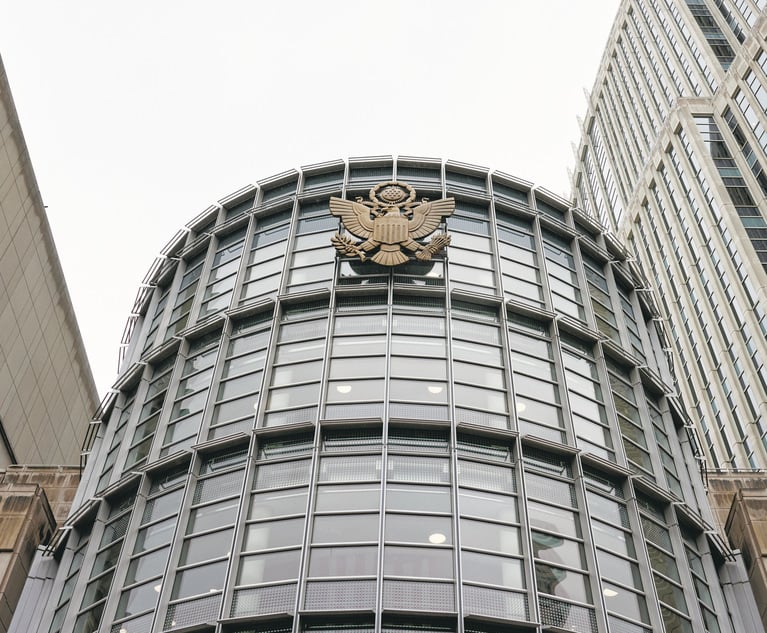Interest Tolling in Mortgage Foreclosure Actions Abrogates Contract Rights and Is Unlawful Under CPLR 5001
When viewed in its proper context, tolling prejudgment interest is contrary to the plain language of CPLR 5001(a), legislative intent and Court of Appeals precedent.
May 14, 2021 at 02:30 PM
10 minute read
 Some New York courts have begun routinely tolling prejudgment mortgage interest as a sanction against mortgage lenders and servicers for perceived delays in the foreclosure process. Exercising their "equitable powers," courts have canceled prejudgment interest as a penalty for delays resulting from, among other things, failing to comply with discovery deadlines or a failure of proof on summary judgment. Close scrutiny reveals that New York courts do not have the power to toll prejudgment interest as a sanction.
Some New York courts have begun routinely tolling prejudgment mortgage interest as a sanction against mortgage lenders and servicers for perceived delays in the foreclosure process. Exercising their "equitable powers," courts have canceled prejudgment interest as a penalty for delays resulting from, among other things, failing to comply with discovery deadlines or a failure of proof on summary judgment. Close scrutiny reveals that New York courts do not have the power to toll prejudgment interest as a sanction.
This power is predicated on decisions of New York's intermediate appellate courts, interpreting New York Civil Practice Law & Rules (CPLR) 5001(a) as allowing only a discretionary award of prejudgment interest in "an action of an equitable nature." This application, however, misunderstands foreclosure actions by conflating the underlying claim at law (breach of contract) with the equitable remedy (foreclosure). When viewed in its proper context, tolling prejudgment interest is contrary to the plain language of CPLR 5001(a), legislative intent and Court of Appeals precedent.
Legislative History of CPLR 5001(a)
CPLR 5001 (formerly §480 of the Civil Practice Act) provides, in relevant part that:
This content has been archived. It is available through our partners, LexisNexis® and Bloomberg Law.
To view this content, please continue to their sites.
Not a Lexis Subscriber?
Subscribe Now
Not a Bloomberg Law Subscriber?
Subscribe Now
NOT FOR REPRINT
© 2025 ALM Global, LLC, All Rights Reserved. Request academic re-use from www.copyright.com. All other uses, submit a request to [email protected]. For more information visit Asset & Logo Licensing.
You Might Like
View All
Disbarred NY Atty Receives 54-Month Prison Sentence After $3M Embezzlement
3 minute read
Unit Owners Sued Board for Failure To Maintain Adequate Fire Insurance: This Week in Scott Mollen’s Realty Law Digest


Law Firms Mentioned
Trending Stories
- 1Buyer Beware:Continuity of Coverage in Legal Malpractice Insurance
- 2‘Listen, Listen, Listen’: Some Practice Tips From Judges in the Oakland Federal Courthouse
- 3BCLP Joins Saudi Legal Market with Plans to Open Two Offices
- 4White & Case Crosses $4M in PEP, $3B in Revenue in 'Breakthrough Year'
- 5Thursday Newspaper
Who Got The Work
J. Brugh Lower of Gibbons has entered an appearance for industrial equipment supplier Devco Corporation in a pending trademark infringement lawsuit. The suit, accusing the defendant of selling knock-off Graco products, was filed Dec. 18 in New Jersey District Court by Rivkin Radler on behalf of Graco Inc. and Graco Minnesota. The case, assigned to U.S. District Judge Zahid N. Quraishi, is 3:24-cv-11294, Graco Inc. et al v. Devco Corporation.
Who Got The Work
Rebecca Maller-Stein and Kent A. Yalowitz of Arnold & Porter Kaye Scholer have entered their appearances for Hanaco Venture Capital and its executives, Lior Prosor and David Frankel, in a pending securities lawsuit. The action, filed on Dec. 24 in New York Southern District Court by Zell, Aron & Co. on behalf of Goldeneye Advisors, accuses the defendants of negligently and fraudulently managing the plaintiff's $1 million investment. The case, assigned to U.S. District Judge Vernon S. Broderick, is 1:24-cv-09918, Goldeneye Advisors, LLC v. Hanaco Venture Capital, Ltd. et al.
Who Got The Work
Attorneys from A&O Shearman has stepped in as defense counsel for Toronto-Dominion Bank and other defendants in a pending securities class action. The suit, filed Dec. 11 in New York Southern District Court by Bleichmar Fonti & Auld, accuses the defendants of concealing the bank's 'pervasive' deficiencies in regards to its compliance with the Bank Secrecy Act and the quality of its anti-money laundering controls. The case, assigned to U.S. District Judge Arun Subramanian, is 1:24-cv-09445, Gonzalez v. The Toronto-Dominion Bank et al.
Who Got The Work
Crown Castle International, a Pennsylvania company providing shared communications infrastructure, has turned to Luke D. Wolf of Gordon Rees Scully Mansukhani to fend off a pending breach-of-contract lawsuit. The court action, filed Nov. 25 in Michigan Eastern District Court by Hooper Hathaway PC on behalf of The Town Residences LLC, accuses Crown Castle of failing to transfer approximately $30,000 in utility payments from T-Mobile in breach of a roof-top lease and assignment agreement. The case, assigned to U.S. District Judge Susan K. Declercq, is 2:24-cv-13131, The Town Residences LLC v. T-Mobile US, Inc. et al.
Who Got The Work
Wilfred P. Coronato and Daniel M. Schwartz of McCarter & English have stepped in as defense counsel to Electrolux Home Products Inc. in a pending product liability lawsuit. The court action, filed Nov. 26 in New York Eastern District Court by Poulos Lopiccolo PC and Nagel Rice LLP on behalf of David Stern, alleges that the defendant's refrigerators’ drawers and shelving repeatedly break and fall apart within months after purchase. The case, assigned to U.S. District Judge Joan M. Azrack, is 2:24-cv-08204, Stern v. Electrolux Home Products, Inc.
Featured Firms
Law Offices of Gary Martin Hays & Associates, P.C.
(470) 294-1674
Law Offices of Mark E. Salomone
(857) 444-6468
Smith & Hassler
(713) 739-1250






